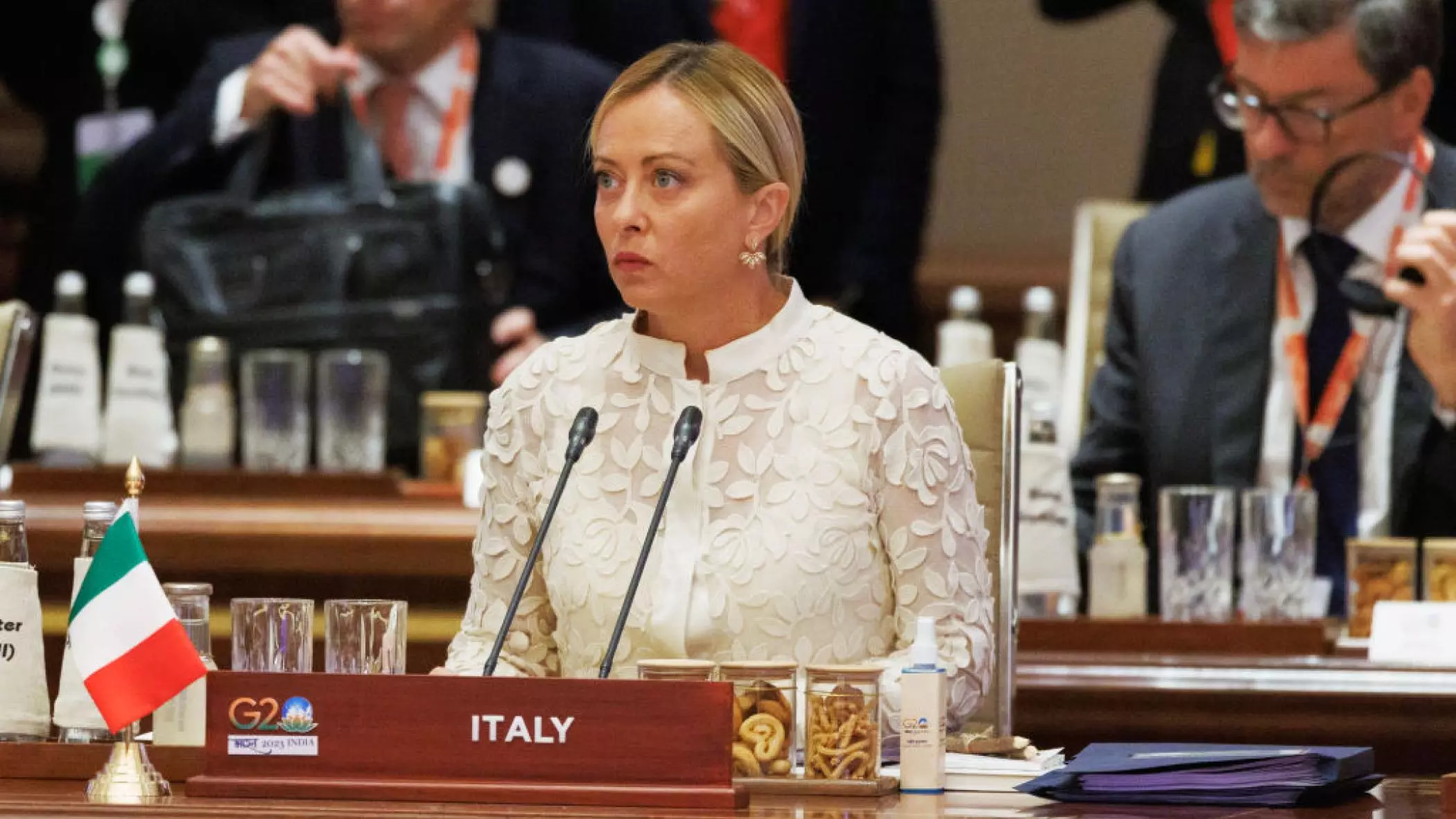“She’s been pretty good on foreign policy so far,” tweeted US political scientist Francis Fukuyama about the Italian prime minister, Giorgia Meloni, last month. Indeed, a year after taking office, Meloni and her government seem to be serving the transatlantic relationship rather well.
Meloni has shown steadfast support for Ukraine, perhaps obscuring the fact that within her government sits deputy prime minister Matteo Salvini – the truculent leader of the traditionally pro-Russian League. Moreover, in May this year, she announced that Italy would effectively end its involvement in China’s Belt and Road Initiative (BRI). Italy then became a signatory of US-backed plans – unveiled at the G20 summit in August – to develop a rival trade corridor to the BRI. US president Joe Biden speaks appreciatively of Meloni, and has hailed an ever closer US-Italian relationship.
So, if Atlanticism were the only benchmark against which to evaluate Meloni’s foreign policy, the good reviews would surely be justified. But with Brussels and other European capitals, things seem to be going less well.
Given the history of rivalry between Rome and Paris, it was no great shock to witness the bouts of squabbling between Meloni and Emmanuel Macron over the past year, on topics ranging from summit invitations to migration. But migration also contributes to a deeper anti-European rhetoric in the Meloni government. A record 200,000 people could cross the Mediterranean to land in Italy this year. Salvini has implied this is an anti-Italian conspiracy on the part of France and Germany, accusing them of “disinterest” in stemming the flow. The tension with Germany then continued in late September, when Meloni wrote to Chancellor Olaf Scholz expressing her “astonishment” at his government’s support for some NGOs that conduct search and rescue operations in the Mediterranean.
And the problems do not end with migration. Members of the Italian government have accused (the Italian) European commissioner for economy, Paolo Gentiloni, of “not doing enough” for Italy. These attacks undermine the commissioner’s authority and betray weakness in the government in Rome, which appears to want a scapegoat for the difficulties it faces due to lower than expected economic growth. Then there is the issue of Italy’s approval of the European Stability Mechanism (ESM) – set up in the wake of the 2008 financial crisis to provide loans to distressed eurozone economies. The Italian right has long suggested that intergovernmental organisations such as this undermine national sovereignty, and Italy is the only eurozone state not to have ratified the mechanism’s treaty. To do so now would not play well with Meloni’s base.
The prime minister also seems increasingly tempted by a return to her populist roots. During the Spanish general election earlier this year, she openly supported the extreme right-wing Vox party, abandoning the neutrality that a foreign head of government should maintain. She then visited Hungarian leader Viktor Orban in Budapest, having avoided an official meeting for nearly a year. These actions respond to a domestic need to compete with Salvini – since, for him, the anti-European, anti-migration line seems the only viable way to try to recover votes.
The League is polling at a modest 9-10 per cent, up from 8.7 per cent in the 2022 election. This suggests that, while voters are not returning to the party in droves having lent their support to Meloni’s Brothers of Italy in the election, Salvini’s rhetoric may be making some headway.
At the European level, however, the League’s proximity to Russia leaves it few friends – and the party will be excluded from any political alliance aimed at obtaining a majority in the European Parliament elections next year.
For Meloni, on the other hand, the European game is still on, and she has held several meetings with the most conservative elements of the European People’s Party (EPP) over the past year. The endgame is to break the alliance between the EPP and the social democrat grouping that constitutes the parliament’s current majority, or help anoint a conservative successor to European Commission president Ursula von der Leyen.
But current polls do not favour such a radical shift in the composition of the parliament. Right-leaning parties will probably make gains, but fragmentation also seems plausible, leading to a new parliament that is similar in composition to the current one (albeit with a weakened majority). If Meloni’s hope of obtaining decisive political clout ebbs away, she could double down on the populist line.
Yet, an antagonistic and economically struggling Italy is not conducive to directing the European Union’s political attention and funding towards issues of Italian interest. The country does not have sufficient political strength to pursue unilateral policies; it needs the trust of its European allies and support from the EU. Otherwise, the Italian government risks undermining even its clever initiatives, such as the Mattei Plan for energy cooperation in Africa.
Meloni therefore needs to work constructively with the EU in areas related to Italy’s strategic interests. This is the best way to tangibly improve the lives of Italians, and by extension confront the domestic challenge she faces from Salvini’s belligerent posturing. She could, for example, focus on reform of the EU’s Stability and Growth Pact to place more emphasis on the growth that Italy lacks. Addressing the EU’s projection towards Africa would also benefit Italy, as would constructively addressing disputes among member states around migration – a problem that will not end with any EU-wide agreement over the coming days.
Meloni enjoys trust and political stability in Italy – and a good relationship with Washington – that few other Italian leaders have enjoyed in the past. What she has not fully grasped is how important Europe will be if she is to capitalise on these advantages. She needs to invest much more in relations with her European partners – and the run up to the European Parliament elections will be crucial in revealing whether she is willing to do so.
About the author
Senior Policy Fellow


